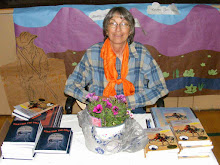I am finding it so interesting to observe the writing process. On the one hand, "I" am doing the writing, but at the same time, "I" am observing what "I" am doing as I write. (I do this same split-brain thing while playing the piano and while riding/working with horses. It's how I learn to improve what I do.) The more I write, the more I learn about different ways to write. I am currently experimenting with the idea of "letting" the story write itself, rather than "making" it happen, which creates pressure/tension.
I have an outline, a rough plan for the plot, for themes I hope will come through. I have characters that I already know pretty well from the previous books (and a new one). I put them in a scene and let them do and say what they will, within the framework I have outlined. Then I watch to see what happens, and write it down. If I am patient and just stand back and look and listen, they come up with the details.
I know I blogged about this some time ago, but today I was reminded of some parallels to what I read in the Bible: "As a writer, I'm kind of playing 'God.' He's got a Big Plan (the plot) and various themes and sub-themes, which will work out the way He has planned, but within that plan, He gives us free will. And everything we choose ends up fitting into His Big Plan! (Unlike me, God doesn't have to wait to find out what His characters will choose to do--He already knows that, as well as the ending.)"
I need to figure out something about my new character (who has not yet appeared): will he be good with horses, or not so good? More a poser? And as I pondered, I heard myself saying to myself, "The reason you don't know is, you haven't seen him ride yet!" So maybe I don't need to figure it out at all--just be patient, wait and watch. I am pretty confident that it will take care of itself. I am learning more and more to not worry, not try too hard, but to trust the writing process, just as in my life I am learning more and more to trust in the Lord with all my heart, not to lean on my OWN understanding, but to acknowledge Him and wait confidently for Him to direct my paths.

